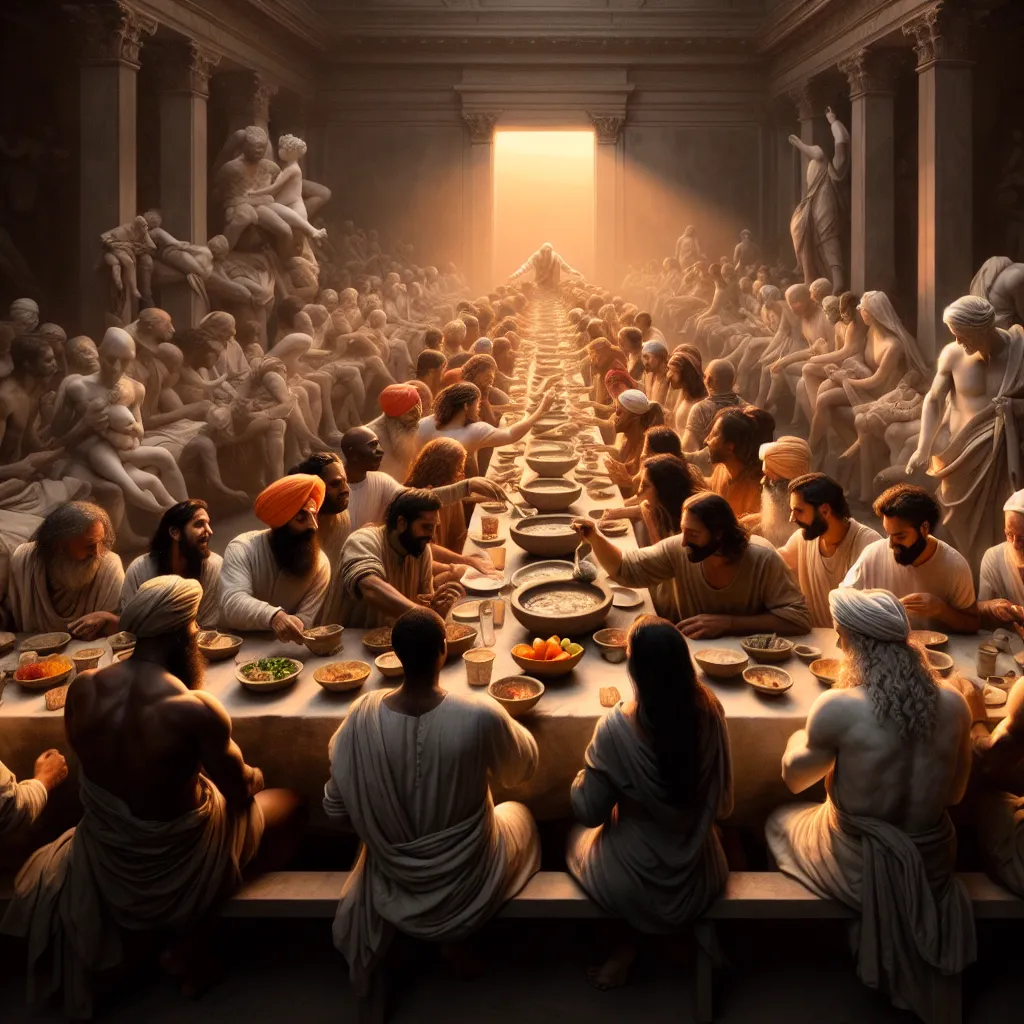
- Published on
- Authors

- Name
- You
The Langar: The Tradition of Free Community Kitchen
Introduction
The Langar, a free community kitchen, is more than just a place providing meals; it’s a profound representation of equality, compassion, and communal harmony in Sikhism. Its origins date back to the early 16th century, initiated by Guru Nanak Dev Ji, the founder of Sikhism. This article delves into the historical roots, spiritual essence, and transformative impact of Langar on societal structures.
Historical Origins
Guru Nanak Dev Ji’s Vision
The conception of Langar can be traced back to Guru Nanak Dev Ji, who emphasized the principles of equality and communal service. He initiated the practice to counter social stratifications and promote a sense of unity among people from diverse backgrounds. The table below highlights key milestones in the history of Langar:
| Year | Milestone |
|---|---|
| 1481 | Birth of Guru Nanak Dev Ji |
| 1510 | Guru Nanak sets up the first Langar |
| 1539 | Guru Nanak’s passing; Langar tradition is carried forward |
| 1604 | Establishment of Langar at the Harmandir Sahib (Golden Temple) |
Spiritual and Social Dimensions
The Philosophy of Equality
Langar exemplifies the Sikh principle of “Seva” (selfless service) and “Sarbat da Bhala” (welfare of all). It underscores the belief that everyone, irrespective of their caste, creed, or social status, is equal in the eyes of the divine. Participants sit in rows on the floor, known as “Pangat,” to partake in the meal, symbolizing unity and egalitarianism.
Compassion in Action
Providing free meals transcends mere charitable acts; it’s a spiritual practice ingrained in Sikhism’s core teachings. Volunteers, known as “Sewadars,” undertake various tasks from cooking to cleaning, reflecting the community’s collective spirit and commitment to compassion.
Langar in the Modern Context
Global Reach
Over the centuries, the practice of Langar has expanded across the globe. Sikh temples, or “Gurdwaras,” in cities worldwide continue this tradition, serving millions of meals without charge. Significant global events, such as humanitarian crises, see Gurdwaras mobilize resources rapidly, highlighting Langar's role in humanitarian aid.
The Science Behind Langar
While the spiritual benefits of Langar are profound, scientific studies also corroborate its positive impact:
- Nutritional Value: Langar meals are predominantly vegetarian, emphasizing health and sustainability.
- Mental Health: Engaging in community service fosters psychological well-being, reducing stress and increasing happiness.
- Social Cohesion: Regular community interactions promote social bonds and decrease alienation.
Case Study: Langar During COVID-19
During the COVID-19 pandemic, Gurdwaras across the world adapted swiftly to continue serving communities. Safety protocols, contactless deliveries, and collaboration with local charities amplified the reach and impact of Langar.
Conclusion
The tradition of Langar stands as a timeless testament to the values of equality, compassion, and service. As a living legacy of Guru Nanak Dev Ji's vision, it transcends religious boundaries, offering nourishment for both the body and soul. In an increasingly fragmented world, Langar serves as a beacon of hope, uniting humanity through the simple yet profound act of sharing a meal.
(Feel free to visit your local Gurdwara and experience the Langar firsthand, contributing to and partaking in this beautiful tradition.)
